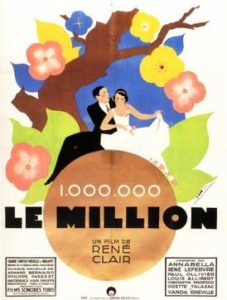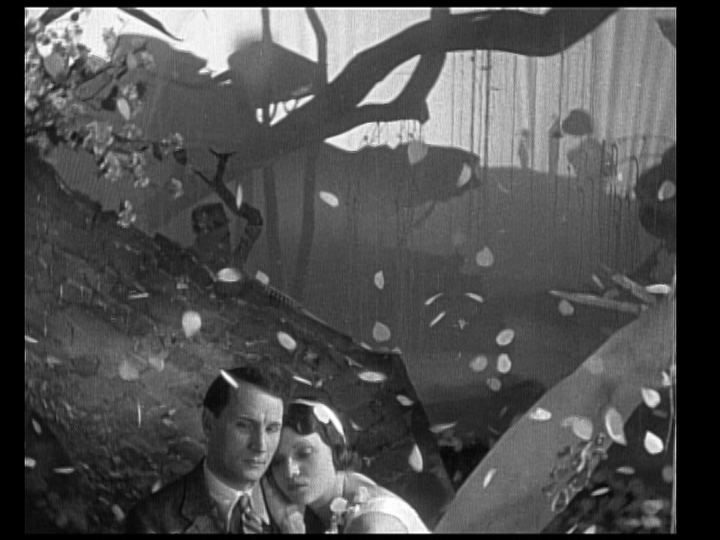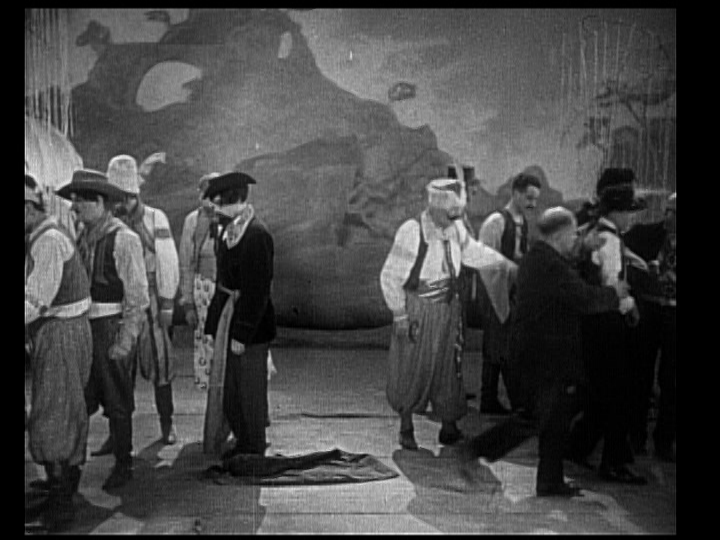|

Synopsis:
A penniless artist (Rene Lefevre) caught flirting with his client (Vanda Greville) is excited to learn from his friend (Louis Allibert) that one of them has won the lottery, but is quickly dismayed to learn that his fiancee (Annabella) has given Lefevre’s coat — which contains the winning ticket — to a thief (Paul Ollivier), who in turn has sold it to a pompous opera singer (Constantin Siroesco). Can the jacket — and the ticket — be found, and Lefevre’s romance with Annabella salvaged?
|
|
Genres, Themes, Actors, and Directors:
- French Films
- Millionaires
- Musicals
- Rene Clair Films
- Romantic Comedy
Response to Peary’s Review:
Peary writes that this “famous early musical” by Rene Clair — centered on a “mad scramble to retrieve [Lefevre’s] jacket from, first, a police fugitive and, later, an opera singer who’s giving his last performance before going on tour” — mixes “farce, slapstick, and Gilbert and Sullivan”; but he argues that while Clair “neatly sets up his gags, they don’t really deliver”, and that “this classic has lost a lot of its freshness.” He points out that the “major problem is obvious – the characters aren’t very funny”. However, he concedes that the “film benefits from Clair’s innovative use of sound and music, as well as his decision to again use Lazare Meerson as his set designer and Georges Perinal as his cinematographer.” I’m more or less in agreement with Peary’s assessment, though I believe the film is innovative enough in its presentation, style, and storyline to merit a must-see look. While we certainly don’t care much about these characters (other than poor Annabella, who has terrible taste in men) and the collective singing is a bit forced, it’s undeniably clever how Clair and his team manage to set up a fast-paced, madcap race for a jacket that’s slippier than black ice; you can’t help feeling viscerably pulled to the beaten-up jacket as you see it hanging on hooks, being torn apart, and landing on top of an unsuspecting taxi cab, all the while knowing that it’s actually the tiny slip of paper inside that’s really desired (will it be there?).
Redeeming Qualities and Moments:
- Luminous cinematography and sets

- Nicely choreographed comedic sequences

Must See?
Yes, once, for its historical relevance as an innovative early talkie-musical.
Categories
(Listed in 1001 Movies You Must See Before You Die)
Links:
|
One thought on “Million, Le (1931)”
First viewing. A once-must – for its place in cinema history and for Clair’s inventive direction.
Even though this is a film that is now edging its way to becoming 100 years old (!), I wouldn’t agree that it has lost “a lot” of its freshness; the closest I could agree to that is the fact that there are occasionally moments that (to modern audiences) come off as being somewhat precious. But, overall, even that is a minor quibble.
I don’t honestly think it matters much that the characters themselves aren’t all that funny. It’s the situation alone that’s the thing here. This is (as the assessment points out) a movie about a (very) wayward jacket – and Clair (often quite cleverly) gets as much mileage (and genuine tension) out of the situation as possible. In other words, I think he very much does deliver. The bulk of the film is pure farce done quite well.
~though I’ll admit to thinking the film’s thrust is somewhat tentative early on, and its kick doesn’t really arrive until the announcement of the winning lottery ticket. (But, again, another minor point. all things considered.)
The film’s highlight comes with the performance at the opera house. I’m not exactly sure why there’s a musical comedy love duet that precedes a three-act opera – but, we’ll let that go. At any rate, the duet on-stage affords a charming counterpoint as the main lovers (upstage and out of audience view) renew their own vows of love.
~which brings us to the opera itself, showcasing the jacket as a centerpiece that is still as elusive as ever. The timing here is wonderfully exact.
(Even though a good deal of the music in the film is not really to my personal liking, I was surprised that I still found it quite enjoyable.)